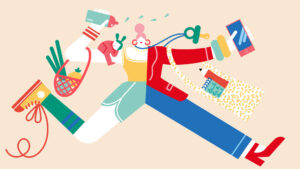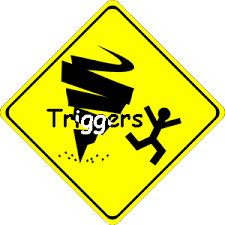Dear Confused,
 Did you ever have one of those days, or weeks. The coffee overflowed the coffee machine, you tripped on something you left on the stairs. Someone cut you off going wrong way down a one-way street. The school called-your child forgot his lunch and there is no money in his account to buy. Your partner had to work late, messing up your plans to go out to dinner with a girlfriend just to vent, and you had to feed all the cranky children instead. Hard to handle, right? And you have a strong and functioning neurological system and the ability to both process challenges and the internal voice (our ego) to remind you, there will be days like this. I bet by the end of this day, you were irritable, snappy and on the verge of tears perhaps. IN part, that is because you have the “ego strength” and the “self-regulation skills” both to remind yourself that hard things do happen but it is not about you (ego strength) and the ability to recognize that you will be okay and will get through it, and if you just stay steady, once the kids are in bed, you can just collapse in that chair and breath deeply for a bit (self-regulation skills). You also have, with years of practice and reducing your own trauma impact, developed a wide window of tolerance for frustration.
Did you ever have one of those days, or weeks. The coffee overflowed the coffee machine, you tripped on something you left on the stairs. Someone cut you off going wrong way down a one-way street. The school called-your child forgot his lunch and there is no money in his account to buy. Your partner had to work late, messing up your plans to go out to dinner with a girlfriend just to vent, and you had to feed all the cranky children instead. Hard to handle, right? And you have a strong and functioning neurological system and the ability to both process challenges and the internal voice (our ego) to remind you, there will be days like this. I bet by the end of this day, you were irritable, snappy and on the verge of tears perhaps. IN part, that is because you have the “ego strength” and the “self-regulation skills” both to remind yourself that hard things do happen but it is not about you (ego strength) and the ability to recognize that you will be okay and will get through it, and if you just stay steady, once the kids are in bed, you can just collapse in that chair and breath deeply for a bit (self-regulation skills). You also have, with years of practice and reducing your own trauma impact, developed a wide window of tolerance for frustration.
This window of tolerance is how much you can balance on your plate, along with the skills you have to take things off or share them with another person. Part of the reason for developing a strong support network is to know, in your heart, that if you call a friend, lean on a partner, or write in your journal, what you can juggle will go up, and your need for tolerance will go down. In any child, this is a small window, and it is impacted a lot by environmental factor. You know, like being hangry, or tired, or on sensory overload. This is why children are always carried screaming and crying from the Farm Show-too much going on, narrow window of tolerance. A history of trauma, especially one where nobody has been able to identify and verbalize all the triggers, can also narrow that window. You may believe your child is being irrational when that lady’s perfume reminds him of the abuser. You may feel he is actively trying to get on your last nerve when the visit to the pet food store hits a nerve with all those cages in the back. You may love summer thunderstorms but for your child, it reminds him of being locked out of the house during a storm so his parents could use drugs. He does not even know what causes it, but it is there.
developing a strong support network is to know, in your heart, that if you call a friend, lean on a partner, or write in your journal, what you can juggle will go up, and your need for tolerance will go down. In any child, this is a small window, and it is impacted a lot by environmental factor. You know, like being hangry, or tired, or on sensory overload. This is why children are always carried screaming and crying from the Farm Show-too much going on, narrow window of tolerance. A history of trauma, especially one where nobody has been able to identify and verbalize all the triggers, can also narrow that window. You may believe your child is being irrational when that lady’s perfume reminds him of the abuser. You may feel he is actively trying to get on your last nerve when the visit to the pet food store hits a nerve with all those cages in the back. You may love summer thunderstorms but for your child, it reminds him of being locked out of the house during a storm so his parents could use drugs. He does not even know what causes it, but it is there.
 The best thing you can do to help your child is two-fold. First, manage your own window of tolerance, but don’t just do it, verbalize it. Say it out loud, “Today was a hard day, so I am crankier than usual, so please get your own snack so I can take a time out.” Talk out loud as you utilize your own self-regulation skills. Identify what you do and why. “I am phoning a friend because this is too much for me right now, set the timer for ten, and then I will start dinner.”
The best thing you can do to help your child is two-fold. First, manage your own window of tolerance, but don’t just do it, verbalize it. Say it out loud, “Today was a hard day, so I am crankier than usual, so please get your own snack so I can take a time out.” Talk out loud as you utilize your own self-regulation skills. Identify what you do and why. “I am phoning a friend because this is too much for me right now, set the timer for ten, and then I will start dinner.”
The second thing you can do is work with your child, and his therapist, to build his self-regulation skills, and widen his window of tolerance. But be aware that his brain is still developing, so this is a long and slow process for some. When he learns a new skill, have him teach it to you and then practice it when things are going well, so that it is easy to do it with him (co-regulation) until he can do it himself. As he builds his skills from both of these sources, he will also build confidence and ego strength to help him get through the tough days better.





